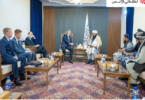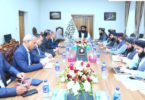Monitoring Desk
KABUL: The amended electoral law transfers the task of the previous Selection Committee to political parties and civil society institutes but strengthens President Ashraf Ghani’s grasp on election affairs, experts say.
The president recently signed changes to the electoral law after they were approved by the Cabinet following consultations with political parties and presidential candidates.
The law was approved in 1395 solar year in 17 chapters and 109 articles until President Ghani decreed amendments, additions and omissions in the law two days ago.
Requirements for membership of the election commission:
According to Article 12 of the electoral law approved in 1395 solar year, a person who nominates his/herself for membership of the commission shall meet the following requirements:
Shall have citizenship of Afghanistan
Shall have good reputation
Shall have completed at least 35 years of age
Shall not have membership of any political parties during incumbency of membership of the commission
Shall have bachelor’s level higher education in the fields of law, Sharia, political sciences, management, sociology, economy and other related fields
Bachelor’s degree holders shall have at least 10 years, master’s degree holders at least 7 years, and doctors at least 5 years of work experience in the government or nongovernment organizations.
Shall not have been convicted by a court for crimes against humanity, felony or deprived of civil rights.
But in the amended version of this article the fields of Law, Sharia, political science, management, sociology, economy and some others have been omitted and work experience for all candidates is reduced to five years.
Selection Committee
Under the 1395 electoral law, the selection committee should be comprised of one representative each from the Supreme Court, the Independent Human Rights Commission, the Independent Oversight Commission for Implementation of the Constitution and civil society.
According to articles 13th and 14th of the law, the selection committee shall introduce 21 persons from among the candidates to the president, who meet highest legal standards.
From among the candidates as mentioned in clause 2 of the article, the president shall appoint seven members of the commission, including at least two female members in the first term, while respecting ethnic and gender composition.
Based on article 28, the Central Election Complaint Commission shall be comprised of five members.
Article 29th says the selection committee shall propose 15 persons from among the persons mentioned in 2nd clause of the article 28 of this law, to the president, taking into consideration the highest legal standards and ethnic and gender composition.
The president then appoints five persons from among the candidates as members of the Central Complaints Commission.
Members of the complaints commission are selected for a five-year term.
But in the presidential legislative degree, issued yesterday, the selection commission has been omitted from the law.
Clause first, article 13 of the amended law says: “Political parties registered with the Ministry of Justice shall introduce one person each and civil society institutes related to elections shall introduce 15 persons, including at least five women, who met the requirements mentioned in Article 12, for appointment as members and secretaries of the two electoral bodies to the President in seven days.”
The president then picks members of the two commissions from the introduced persons. While there are 72 political parties registered with the Ministry of Justice.
The amended law says those introduced for membership of the election commissions by political parties and civil society groups should not have membership of any political party.
Political affairs expert Ghulam Jilani Zwak said the amended electoral law increased the president’s authority in electoral affairs.
He said under the previous law the selection committee would introduce 21 shortlisted nominees for the election commission and 15 for the complaints commission, but now the president would select individuals of his choice from a group of 90 people.
Electoral watchdog TEFA chief Mohammad Ayubzada also said the amended electoral law granted more powers to the president.
He said a number of presidential candidates wanted to use the amendments in their favor.
According to the approved amendments, the Ministry of Justice could be a reference in an individual’s membership with a political party.
But how the Ministry of Justice could recognize an individual’s membership with a political party, Abdul Satar Sadat, a former IECC member, said the ministry could recognize it through many ways.
Article 13 of the amended law says the president shall appoint, considering ethnic and gender composition, seven members of the election commission for a five year term, including at least two women, who have received most of the votes
The article 7 says if tribal and gender composition is not considered among the candidates for membership of the commissions, the president should give priority to most vote-getters.
The clause 8 of the same article says if a political party or civil society institute could not introduce eligible persons as mentioned in the clause first for membership of the commissions, the members would be appointed from among the introduced individuals.
If two or more individuals obtain equal votes, the member who is voted by the president shall be appointed.
The amended electoral law also says the government could appoint two international experts as members of the election commission in cooperation with the United Nations to ensure transparency in elections. (Pajhwok)






